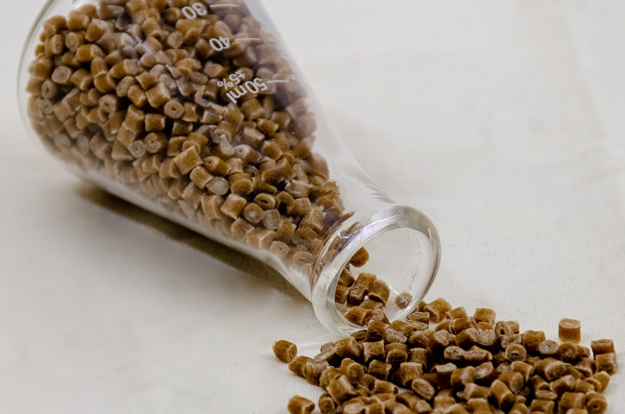What around you is made of plastic? Your water bottle cap, your phone case, your computer mouse, your kids’ toys—all of these are likely hard plastic, which is made of petrochemical-based polymers sourced from petroleum, a fossil fuel.
Applied Bioplastics seeks to change that with its plant-based polymers—technology that avoids 500 kg of CO2 emissions per metric ton of material, according to the company. These polymers replace 30 percent of the petrochemical content used in plastic, which would have enormous impact when deployed at scale.
Crucially, this technology goes where no plastic alternative has gone before: it creates plastics at a similar cost as that of traditional plastics; uses equipment that any plastic manufacturer already has; and replaces a far higher percentage of petrochemicals than its competitors do, according to Applied Bioplastics’ founders. The Applied Bioplastics team intends to continue optimizing its technology to replace more and more of the petrochemical content of plastics.

Depending on the amount of post-industrial plastic waste used, Applied Bioplastics’ polymers can reduce between 43 and 97 percent of the carbon emissions associated with plastic production, the company’s Co-founder and Chief Impact Officer Alexander Blum says: “The decarbonization effect of choosing this technology really can’t be overstated. Over the next 30 years, eight percent market penetration from our company alone—this doesn’t include licensing or anything like that—would be the equivalent of 287 million cars coming off the road.”
This technology has its roots in Bangladesh, where Alexander met a scientist, Dr. Mubarak Ahmad Khan—now the company’s chief scientist emeritus—while he was filming a documentary about the Rohingya genocide. Alexander, alongside Applied Bioplastics’ Co-founder and CEO Colin Ardern and their team, continued iterating on Khan’s work to move it toward commercialization.
The company now has 15 employees and is fundraising to support even more hires to advance its commercialization and scaling efforts. Learn more about the company here.
Applied Bioplastics is currently in acceptance testing with several major corporates, according to Alexander, and in the next year intends to continue conversations with these and other responsible manufacturers, work with more growers in additional geographies to source plant matter, and zero in on a key strategy: licensing.
“The way that this spreads out across the world, the way that this becomes a global standard, is through licensing,” Alexander says. “We’re beginning conversations with major corporates that already do most of the world’s plastic production. We don’t want to take them out of business—we want to help them do what they do, but better, cheaper, and more sustainably.”
Applied Bioplastics is an Inaugural Member of Greentown Houston, which will open its doors in spring 2021. The startup is headquartered in Austin, Texas, and the team has found great benefit in tapping into the Greentown Houston and Boston climatetech ecosystems.
“Being part of this cleantech community is so gratifying, and we can talk to others that have similar kinds of challenges,” explains Ron Martin, the company’s chief strategy officer. “The community supports each other and helps us all make a greater impact sooner.”
“Our experience has been incredibly positive so far, from connections with other member companies to Greentown partners to attending a lot of the programming that Greentown’s put together,” Colin says. “We’ve already got a ton of value out of the programming.”


